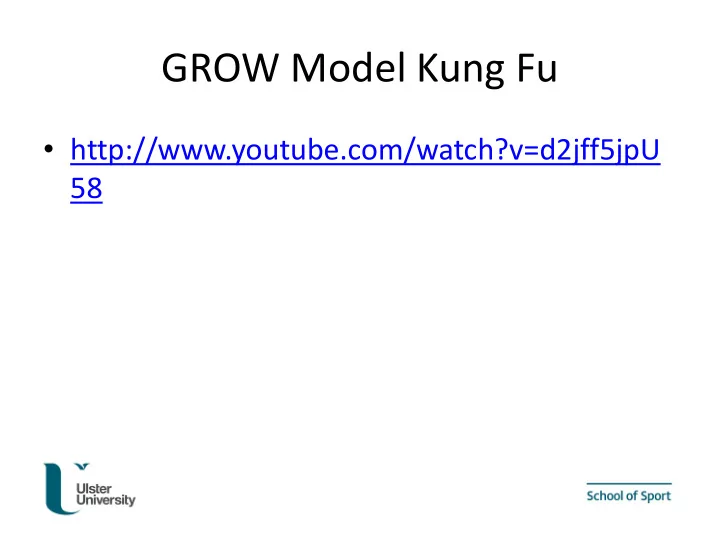

GROW Model Kung Fu • http://www.youtube.com/watch?v=d2jff5jpU 58
Practical Mentoring Children’s Coaching Conference 5 th September 2016 Tandy Haughey & Robin Gregg
Learning Outcomes • To critically reflect on mentoring within sport; • To identify strategies to integrate mentoring within your current context;
Origins – Greek Mythology When Odysseus left for war, he placed his only son with a wise, older man named Mentor. In tribal cultures; shamans and elders guided or “mentored” the entire tribe in every aspect of their lives.
Key words which define what mentoring means to you? Think individually; • Discuss in small groups •
Power Reflection Guidance Learning/ Informal Challenge development Formal
Mentoring “associated with enlightened good practice in relation to developing coaches’ knowledge and expertise ” Bloom, Durand-Bush, Schinke & Salmela, (1998)
Definition?? – Why? “there are almost as many definitions of mentoring as there are individual coaches, mentors or tutors” Parsloe & Wray, (2000)
What is your experience?
Task One • Identify someone who had a strong influence on your coaching development? • Describe the influence he/she had on you?
Where does your experience fit? Being a role Building your Being a model confidence resource Developing Challenging & knowledge & Other? questioning skills
• Were they more experienced? • Senior to you? Describe • What made them effective? your • How did you source them? mentor/s • What type of relationship?
Identify the key Share your knowledge & Summarise to a experience skills the mentor flipchart demonstrated
When to coach or mentor? • https://www.youtube.com/watch?v=kRJhjS-s- Uw
Types of mentoring (scUK) Where did your experience sit? Informal Formal Coach/assistant Friendship Ad hoc encounter Qualification programme
What is common? Emphasis appears to be • Cassidy, Jones & Potrac, placed on the guidance (2004) function All include verbs such as; • Parsloe & Wray, (2000) support, guide and facilitate Importance placed upon • Parsloe & Wray, (2000) listening, questioning and enabling
Stages of reflection cycle Description • Listening & questioning Evaluation • Questioning Analysing • Challenging Concluding • Directing & assisting Action Planning • Clarifying
Mentoring is a complex, social, and psychological activity and therefore cannot be to prescriptive. Monaghan & Lunt, (1992)
Over-formalising the mentoring relationship can hinder the formation of rapport “affecting the degree of trust and openness” which in turn has an effect on the quality of the relationship and thus the degree of learning and development that is likely to occur. Klasen & Clutterbuck (2002 )
Most definitions outline the relationship between mentor and mentee as one of intense “caring” Jones, Harris & Miles, (2009)
Types of mentoring (Jones, Harris & Miles, 2009) • Mentee sets the agenda; Responsive • Autonomous and linked to experienced mentees • Co-operative, mentor and mentee recognise each Interactive other as peers; • Experienced mentees • Can be problems with responsibility • Mentors set the agenda and will seek to guide the Directive mentee to encourage corrective action • More novice mentees
Learning Stages Modelling • Needs a prescribed set of routines and skills. The coach will attempt to copy behaviours. Competency • The coach aims for mastery of a set of skills • The creation of a personal model for coaching based on a set of Reflection values and beliefs. This involves reflection on the leaner’s own practice and investigation of others. • The reflection and enquiry of an earlier stage has resulted in a Autonomy strongly held set of beliefs and values that create a context for the assimilation of all new information and activities.
What stage are the coaches you work with at?
Learning Stages Modelling • Needs a prescribed set of routines and skills. The coach will attempt to copy behaviours. Competency • The coach aims for mastery of a set of skills • The creation of a personal model for coaching based on a set of Reflection values and beliefs. This involves reflection on the leaner’s own practice and investigation of others. • The reflection and enquiry of an earlier stage has resulted in a Autonomy strongly held set of beliefs and values that create a context for the assimilation of all new information and activities.
Mentor roles at different stages Stage of learning Mentor role Mentor skills Modelling Providing a model, being Demonstrating observed/co-coaching competency. Explaining/teaching Competency Coach Observing, giving feedback. Facilitating reflection. Reflection Facilitator Objective support. Challenger Questioner. Managing learning. Autonomy Partner/enquirer Communicator
Opportunity to practice • Task – set up a mentoring scenario in pairs • Think of an area for development for you within your coaching context. • Mentor to use this as the basis for a professional discussion.
Be clear on the Think & prepare Understand goals for the for your your current coaches in your mentoring profile context sessions
Initial tasks Clarifying Agreeing Establishing expectations priorities a goal
Mentors add value…. Proven processes to support A neutral sounding communication, resolve Drive the partnership board problems & identify opportunities Demonstrate active Signpost to resources listening
Impact of mentoring Making the connection • New information • Coaching from coach behaviour, • Linking new and education, CPD decision making existing and other sources information to practice Theory Practice
“I consider it a scared trust: helping to mould character, instil productive principles and values, and provide a positive example to those under my supervision. Furthermore, it is a privilege to have responsibility, opportunity, and obligation, one that should never be taken lightly.” John Wooden
Kill Bill https://www.youtube.com/watch?v=xsKIkZNAv3 A
Recommend
More recommend